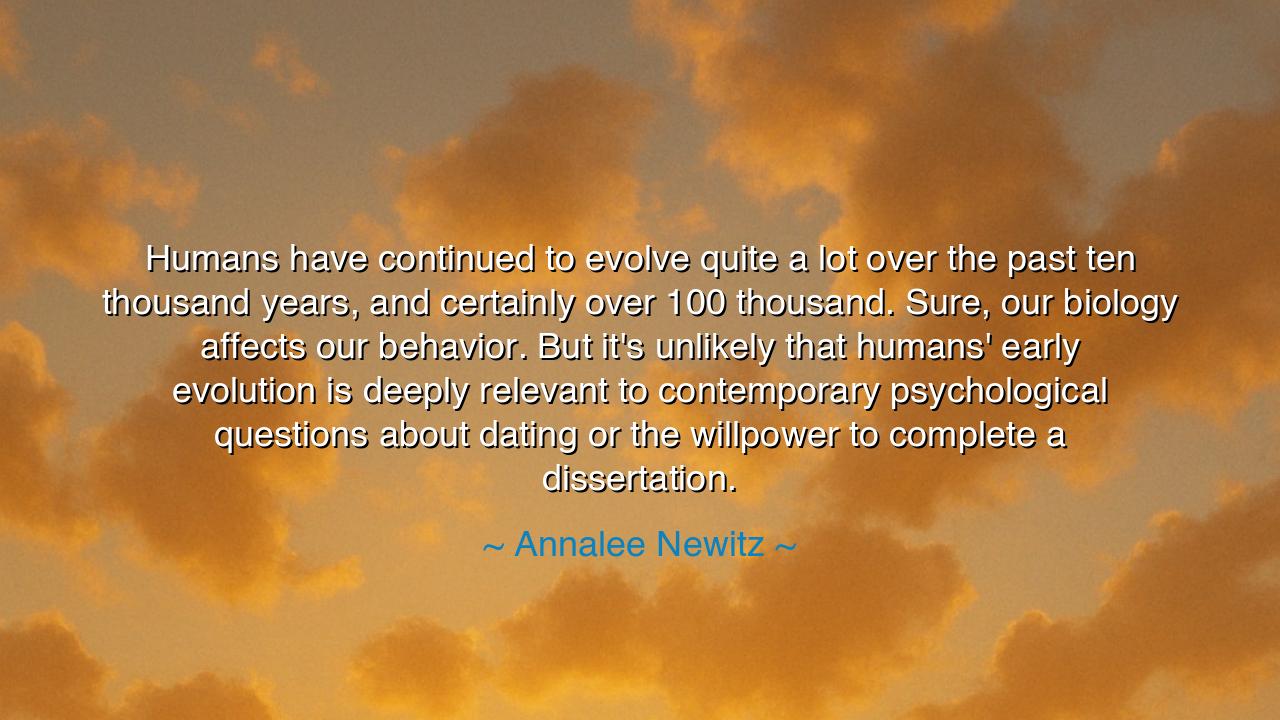
Humans have continued to evolve quite a lot over the past ten
Humans have continued to evolve quite a lot over the past ten thousand years, and certainly over 100 thousand. Sure, our biology affects our behavior. But it's unlikely that humans' early evolution is deeply relevant to contemporary psychological questions about dating or the willpower to complete a dissertation.






In the councils of wisdom, a clear bell sounds: “Humans have continued to evolve quite a lot over the past ten thousand years, and certainly over 100 thousand. Sure, our biology affects our behavior. But it’s unlikely that humans’ early evolution is deeply relevant to contemporary psychological questions about dating or the willpower to complete a dissertation.” Hear the balance in this saying: reverence for our animal roots, refusal to let those roots overgrow the living garden of culture, history, and choice. The past is a foundation, not a prison. What our ancestors needed on the savannah is not always what our souls require in the library, the lab, or the crowded café where two people decide whether to meet again.
The ancients taught that time itself is a sculptor. In the last ten thousand years, harvests remade our bodies, cities remade our nerves, letters remade our minds. New diets bred new tolerances; new plagues trained new defenses; new crafts demanded new forms of attention. The river of change did not freeze when spears were laid down; it braided into agriculture, trade, law, ritual, and the subtle arts of self-command. Thus, while biology sets ranges, the music we play within those ranges is patterned by schools and households, screens and scriptures, mentors and markets.
Beware, then, the lazy spell that says, “Because our ancestors hunted, we must court this way,” or, “Because tribes once roamed, no scholar can muster willpower to finish a dissertation without some ancient hack.” Early evolution bequeathed appetites and alarms; it did not compose the syllabus. Contemporary pressures—deadlines, debt, sleep, mentorship, feedback loops—explain far more about whether a student writes Chapter Three or whether two people build a second date. Evolution whispers; institutions and habits shout.
Consider a story of ordinary heroism. A graduate student, first in her family to attempt the PhD, finds her pages stalling. She does not consult the Pleistocene; she consults her cohort. Together they craft a weekly ritual: pages exchanged at dawn, phones asleep in another room, a kind elder reading drafts with a pencil that blesses as it corrects. The thesis moves. What changed? Not genes, but structure; not “stone-age brains,” but present-tense scaffolding—sleep, accountability, a kinder voice in the head. The will, like a muscle, grows with repetitions that the village makes possible.
So too with dating. In one century, marriages may be brokered by families; in another, by dances; now, by glances on a screen. The same nervous system enters very different theaters. What predicts kindness, reciprocity, and endurance is less the ghost of a hunter-camp than the grammar of modern life: consent taught clearly, boundaries honored, communication practiced, time made sacred. Courtship is choreography—learned steps, not only limbic surges. When we change the room, we change the dance.
The meaning of the proverb, then, is not to deny biology, but to put it in its rightful seat—present at the table, not seated on the throne. Our bodies are instruments; culture is the score; character is the musician’s discipline. We do not escape the past; we edit it with grace. We inherit, but we also invent. And invention—ethical, educational, communal—is how a species that once knapped flint now writes equations, builds clinics, and keeps promises through dark winters.
Take this as a traveler’s rule. When facing a modern puzzle—love, work, scholarship—ask first about environment, incentives, training, and care before invoking ancient scripts. Cultivate practices that beat back fatalism: (1) for willpower, carve small, repeatable rituals and enlist a circle that expects your pages; (2) for dating, privilege clarity over chemistry alone—learn to ask better questions and to listen without performance; (3) for life in general, design your days so good choices are the easy ones—sleep scheduled, meals real, distractions distant, allies near. In this way you will honor the story written in bone while writing, line by line, the brighter chapter that bones alone could never foretell.






AAdministratorAdministrator
Welcome, honored guests. Please leave a comment, we will respond soon